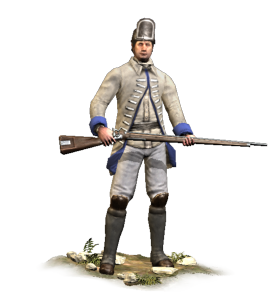Difference between revisions of "Jaegers (ETW Unit)"
CoconutFred (talk | contribs) (Created page with "{{ Unit|image=Image:Jaegers.png''Jaegers are german and austrian variations of Light Infantry.''|Class=Light Infantry|Men=80|Recruitable From=** *Barracks *Drill School *Mili...") |
(→Overview) |
||
| Line 10: | Line 10: | ||
Light infantry are skirmishers who harass the enemy while screening the main body of an army. | Light infantry are skirmishers who harass the enemy while screening the main body of an army. | ||
| − | == | + | ==Game Description== |
Initiative, aggression and pace of action mark these men out and they consider themselves a cut above other infantry, regardless of the title that they use. Light infantry, jaegers or chasseurs do not mindlessly follow orders, but pick and choose their own ground and targets, using such cover as they can find. They carry standard smoothbore, muzzle-loading muskets, but they do not rely on massed volley fire: they deliberately aim (as well as they can, given that muskets lack sights), at individuals within the enemy ranks. This selective fire can disrupt enemy formations or drive off enemy skirmishers. Over time, developments in tactics and weapons will make them very effective as snipers as well as covering forces. | Initiative, aggression and pace of action mark these men out and they consider themselves a cut above other infantry, regardless of the title that they use. Light infantry, jaegers or chasseurs do not mindlessly follow orders, but pick and choose their own ground and targets, using such cover as they can find. They carry standard smoothbore, muzzle-loading muskets, but they do not rely on massed volley fire: they deliberately aim (as well as they can, given that muskets lack sights), at individuals within the enemy ranks. This selective fire can disrupt enemy formations or drive off enemy skirmishers. Over time, developments in tactics and weapons will make them very effective as snipers as well as covering forces. | ||
In 1700, many European nations did not recruit light infantry regiments. Each line infantry regiment had a light company, but the mass volley was the proper way to employ firepower. As irregular light troops proved their worth and tribal natives refused to co-operate by fighting formal, set piece battles, it was realised that collecting together light companies in ad hoc regiments was no longer enough. Direct recruitment of light infantry regiments began in earnest, and by the end of the 18th Century every army fielded fast, light regiments. | In 1700, many European nations did not recruit light infantry regiments. Each line infantry regiment had a light company, but the mass volley was the proper way to employ firepower. As irregular light troops proved their worth and tribal natives refused to co-operate by fighting formal, set piece battles, it was realised that collecting together light companies in ad hoc regiments was no longer enough. Direct recruitment of light infantry regiments began in earnest, and by the end of the 18th Century every army fielded fast, light regiments. | ||
| + | |||
| + | ==Overview== | ||
| + | |||
| + | While they are called by a different name, are functionally identical to other light infantry on the battlefield, with all the same abilities. | ||
== Factions == | == Factions == | ||
Revision as of 20:13, 24 August 2011
Light infantry are skirmishers who harass the enemy while screening the main body of an army.
Contents
Game Description
Initiative, aggression and pace of action mark these men out and they consider themselves a cut above other infantry, regardless of the title that they use. Light infantry, jaegers or chasseurs do not mindlessly follow orders, but pick and choose their own ground and targets, using such cover as they can find. They carry standard smoothbore, muzzle-loading muskets, but they do not rely on massed volley fire: they deliberately aim (as well as they can, given that muskets lack sights), at individuals within the enemy ranks. This selective fire can disrupt enemy formations or drive off enemy skirmishers. Over time, developments in tactics and weapons will make them very effective as snipers as well as covering forces.
In 1700, many European nations did not recruit light infantry regiments. Each line infantry regiment had a light company, but the mass volley was the proper way to employ firepower. As irregular light troops proved their worth and tribal natives refused to co-operate by fighting formal, set piece battles, it was realised that collecting together light companies in ad hoc regiments was no longer enough. Direct recruitment of light infantry regiments began in earnest, and by the end of the 18th Century every army fielded fast, light regiments.
Overview
While they are called by a different name, are functionally identical to other light infantry on the battlefield, with all the same abilities.
